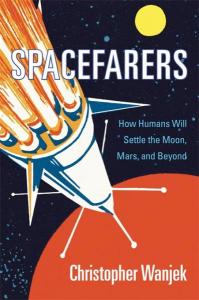
Christopher Wanjek—Spacefarers: How Humans Will Settle the Moon, Mars, and Beyond
HOW HUMANS WILL SETTLE THE MOON,
MARS, AND BEYOND
Christopher Wanjek
Harvard University Press; Illustrated Edition, April 14, 2020, $29.95
ISBN-10: 067498448X; ISBN-13: 978-0674984486
Wanjek reports:
My book Spacefarers explores the challenges of living in space and on other planets and moons from the perspective of biology, engineering, economics and philosophy.
While many books have speculated on the possibility of living beyond the Earth, few have delved into the practical challenges and plausible motives for leaving the safe confines of our home planet. As such, these books are more hype than reality.
I argue that there is little doubt we will be returning to the Moon and exploring Mars in the coming decades, given the potential scientific and commercial bonanza. Private industry already is taking a leading role and earning profits from human space activity. This can be a sustainable venture and a natural extension of earthbound science, business, and leisure.I envision hotels in low-earth orbit and mining tourism on the Moon. Lunar science bases will be analogous to bases on Antarctica, with year-round crews supporting scientists and engineers visiting for a few months. Few will settle on the Moon, though. Low gravity won't permit childrearing. I also propose the slow, steady development of science bases on Mars beginning in the 2040s at the earliest, to be followed by settlements only if Martian gravity will permit reproduction and healthy child development—a major unknown.
I was fortunate in that my publisher, Harvard University Press, approached me for a book idea. No agent. They were developing a new series and said I could have any topic in the universe. Yet my choices—black holes, gravitational waves, Big Bang, dark energy—were all taken! What a relief, actually.
Space colonization proved to be a fun topic in which I could inject a little bit of realism…and levity. I was given nine months to write the book; and with nine proposed chapters in my head, I set a month deadline per chapter. This was like writing nine magazine pieces.
My only mistake was not knowing the word count would include the index and appendices. This meant cutting 10,000 words. Entire sections needed to be axed. Young writers, know your word count well!
Contact info: -
- Christopher Wanjek, 410-467-1523, christopherwanjek@nasw.org, https://christopherwanjek.com, @wanjek
- Book: https://www.hup.harvard.edu/catalog.php?isbn=9780674984486
- Publicist: Colleen Lanick, 617-495-4714, colleen_lanick@harvard.edu
NASW members: will your book be published soon? Take advantage of this opportunity for shameless self-promotion. Submit your report for Advance Copy.
Tell your fellow NASW members how you came up with the idea for your book, developed a proposal, found an agent and publisher, funded and conducted research, and put the book together. Include what you wish you had known before you began working on your book, or had done differently.
See https://www.nasw.org/advance-copy-submission-guidelines.
Review Advance Copy archives at https://www.nasw.org/member-article/advance-copy.
Thinking of writing a book? If you are a NASW member, you may access a list of more than 150 books and online resources to help you craft your book proposal, find an agent and funding sources, negotiate your contract, learn about self-publishing, publicize and market your book, and more at https://www.nasw.org/article/write-book.
Send book info and questions about book publishing to Lynne Lamberg, NASW book editor, llamberg@nasw.org.
Follow @LynneLamberg
Hero image by Cristina Gottardi on Unsplash
Advance Copy
The path from idea to book may take myriad routes. The Advance Copy column, started in 2000 by NASW volunteer book editor Lynne Lamberg, features NASW authors telling the stories behind their books. Authors are asked to report how they got their idea, honed it into a proposal, found an agent and a publisher, funded and conducted their research, and organized their writing process. They also are asked to share what they wish they’d known when they started or would do differently next time, and what advice they can offer aspiring authors. Lamberg edits the authors’ answers to produce the Advance Copy reports.
NASW members: Will your book be published soon? Visit www.nasw.org/advance-copy-submission-guidelines for information on submitting your report.
Publication of NASW author reports in Advance Copy does not constitute NASW's endorsement of any publication or the ideas, values, or material contained within or espoused by authors or their books. We hope this column stimulates productive discussions on important topics now and in the future as both science and societies progress. We welcome your discussion in the comments section below.





